Peter MALONE
Saturday, 18 September 2021 19:25
Rachel River
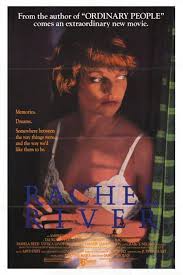
RACHEL RIVER
US, 1987, 90 minutes, Colour.
Zeljko Ivanek, Pamela Reed, Craig T.Nelson, Viveca Lindfors, James Olson.
Directed by Sandy Smolan.
Rachel River is based on Minnesota short stories by Caroline Bligh. The screenplay is by novelist Judith Guest (Ordinary People). It is a production in the American Theatre Playhouse. It captures the atmosphere of the Minnesota town in winter, a cross-section of the people - presented sympathetically, warts and all. The film also has a very good cast with Pamela Reed as Mary, the radio announcer, from whose perspective we see the characters; Viveca Lindfors as a migrant grandmother devoted to her ailing husband; Craig T. Nelson as the deputy sheriff; James Olson as the very proper undertaker.
A warm piece of Americana, a microcosm of today's society.
1. The portrait of people, of a town, of human nature?
2. Location photography, the town, the winter, the river? Ordinary life and its detail? Musical score?
3. The death as the focus and the catalyst for people's reactions: Mo-Mo?, his discovering the body, the death of the aunt, his, reputation, money? Marlyn and his devotion, watching television with her? Hoping for the inheritance? His sister and her criticisms? The haggling about the coffin? The haggling at the burial? The truth of her leaving the money to Mo-Mo? Mary's radio tribute to her?
4. Mary's perspective: the radio program, the story of St. Alban as a martyr for his people and the reference to the Norwegian farmer? Her program listened to? Her child, alone, need for money? Friendship with Jack, his offering to have lessons and pay for them? Meeting with Harriet, sharing with her? Marlyn and her antipathy, her drinking at the bar, getting drunk, dancing and imagining the past? Deciding to spend the night with him? The search for Harriet and finding her? Jack and his accusations of Marlyn being dumb, her response that it was her choice, and acting dumbly? The final broadcast and tribute to the aunt?
5. Jack, proper, the salesman and the techniques, his not wanting to use them, Marlyn and his sister and their haggling about the coffin? Offering to take lessons to help Mary financially? His attraction towards her, his expression of his disappointment in her spending the night with Marlyn?
6. Marlyn, alone, the deputy sheriff, no phone, watching football with his aunt? His wanting the sheriff to tell his sister? Arguing about the coffin and wanting the cheapest one? His sister calling him cheap? The argument at the burial? At the bar, advances towards Mary, the dancing, the night with her, having to get up and go on the search, leaving her unemotionally?
7. Harriet and her devotion, her age, memories of the old country? Her husband and the story of St. Alban? Her visits to the hospital, being with him, talking and singing? The meeting with Mary and singing her the song? Her son and the selling of the farm, her resigned reaction? Her explaining it to her husband, taking the responsibility? Walking to the farm, imagining him there? Collapsing in the snow? Being found, going back to the hospital, in bed with her paralysed husband?
8. The sheriff, the men, the job, the bar, talk around the town, perspective on things - and memories of the war?
9. Mo-Mo?, wandering the paddocks, the river, finding the body? Slow-witted? Inheriting the money?
10. Rachel River as a microcosm?
Published in Movie Reviews
Published in
Movie Reviews
Tagged under
Saturday, 18 September 2021 19:25
Ruthless People
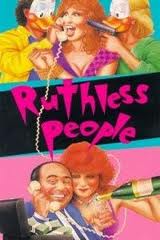
RUTHLESS PEOPLE
US, 1986, Colour, 93 minutes, Colour.
Bette Midler, Danny de Vito, Helen Slater, Judge Reinhold, Anita Morris, Bill Pullman.
Directed by Jim Abrahams, David and Jerry Zucker.
Ruthless People is an amusing, if sometimes raucous comedy. It was written by Dale Launer, writer of such comedies as Outrageous Fortune, and was directed by the team which made Flying High and Top Secret, Jim Abraham and David and Jerry Zucker. (Abraham was to go on to make Big Business with Bette Midler and Lily Tomlin, Zucker was to go on to make Ghost.)
The film has an excellent cast led by Danny de Vito as a selfish husband wanting to kill his wife, played by a raucous Bette Midler. She is kidnapped, most ineffectually, by less than ruthless Judge Reinhold and Helen Slater. In the background is de Vito's mistress, played by Anita Morris, and her dumb boyfriend played by Bill Pullman.
There are all kinds of complications and misunderstandings - with a neat comeuppance ending.
This was near the beginning of Bette Midler's comeback in the 1980s where she made a successful group of films for Touchstone including Down and Out in Beverly Hills, Outrageous Fortune, Big Business, Beaches.
1. Entertaining comedy? Characters and caricatures? Conventional situations being spoofed? Happy misunderstandings and coincidences?
2. Californian settings, affluence, shops, suburbia, the streets? The jaunty musical score and theme song?
3. The title, each of the characters fitting this title - with varying degrees of ruthlessness or lack thereof?
4. The portrait of Sam Stone: small, Danny de Vito's presence and style? Explaining his marriage and money situation, his relationship with Carol and its sexiness, not knowing that she was planning to blackmail him? His antagonism towards his wife and plan to murder her? His reaction about the kidnapping? Calling the police and media? His reactions to Kenny and the deals? Carol's misunderstandings? His being arrested? In prison, bail? The evidence against him? His wanting to have his wife alive after all the bargaining to get her dead? Collaboration with the police? His stakeout, answering the phone, the confrontation with Kenny, wanting the money? His going to the pier? His final grief (contrasting with his continued laughter and champagne-drinking)? (His antagonism towards Barbara's dog?) The finale and his being kicked into the water? Clever caricature?
5. The contrast with Barbara and her gaudy hairdo, weight and style? Screeching? Kicking at Kenny and Sandy, not eating her meals, reading the magazines, watching television, the temptation to do exercise, her fitness and calling the TV compere a wimp? The effect on her personality? Friendly towards Kenny and Sandy, the dresses, the truth about the kidnapping, the K-mart kidnapping, being marked down? Arranging the plot? Phoning Sam and insulting him? The finale - with the incident and the bedroom killer, identifying the killer as the kidnapper? Kicking Sam into the water, joining Sandy and Kenny?
6. Kenny and Sandy, the background of their poverty, the planned occult compensation in kidnapping Barbara, the masks, not being well prepared, niceness - Kenny with the daddy-longlegs, saving it and then stamping on it? Their treatment of Barbara and her reaction against them? Kenny in the shop, trying to sell goods, selling the loudest amplifiers - but sympathetic to the pregnant wife? The police interrogation and his trying to escape? His fears, the police, the confrontation with the bedroom killer? Sandy, pleasant style, delighted with Barbara's liking the clothes? The final plan, Kenny and the hold-up, being robbed by Earl and the police saving him? Driving into the water - and emerging with the money?
7. Carol and Earl, sexy, her relationship with Sam, the plan for videoing the murder for blackmail, not being able to watch, sending it to the police chief, not understanding his hesitations, demanding Sam's arrest? The fear of Sam? The discovery of the truth? Her relationship with Earl, dumb, his reaction to filming the scene, his lack of understanding? The final hold-up and the police converging on him? Their come-uppance?
8. The police chief, taking the prostitute to the hill, the sexual encounter and its being filmed, receiving the tape in the mail, Carol's phone calls, his arresting Sam? Finally leaving town?
9. The police, their investigations, the young policeman in Sam's house, friendly, the dog? The chief and the stakeout of the meetings? The grand finale and everything in order?
10. The bedroom killer, the background, his coming into the house, Barbara reminding him of his mother, his death - and being able to be the final corpse?
11. Popular ingredients, humorously done?
Published in Movie Reviews
Published in
Movie Reviews
Tagged under
Saturday, 18 September 2021 19:25
Rush
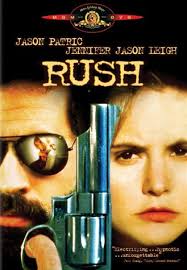
RUSH
US, 1992, 120 minutes, Colour.
Jason Patric, Jennifer Jason Leigh, Sam Elliot, Max Perlich.
Directed by Lili Fini Zanuck.
Rush is a drama about drugs and undercover police agents, entering into the world of drug-dealing in a small American city and the lines blurring between their work and the effects of the drug world and drugs on them. (The kind of thing that was presented in William Friedkin's Cruising, where Al Pacino went into the gay world and it had effect on his personality and style.)
The film is based on a book by Kim Wozencraft, loosely based on her real-life experiences as a Texas narcotics officer. The film is adapted by writer Pete Dexter, who adapted his novel Paris Trout for a cable telemovie. The film was directed by Lili Fini Zanuck, wife of producer Richard Zanuck and partner with him in producing such films as Driving Miss Daisy. It is her directorial debut.
Jason Patric (Lost Boys, Beast, After Dark My Sweet) is the serious-minded, self-assured young officer who is destroyed by his work. Jennifer Jason Lee is particularly good as the officer who is his partner and who finds she has more physical and moral strength than she expected. (Jennifer Jason Lee's credits include Fast Times at Ridgemont High, The Hitcher, Last Exit from Brooklyn, Miami Blues.) Singer Greg Allman makes his debut as the drug-dealing suspect. Sam Elliott is the police officer who acts as control for the partners.
The film is grim, shows drug-dealing in a small Texas city in the mid-'70s - which makes it easier, perhaps, for a '90s audience to appreciate the difficulties, seeing them dramatised in the historical past. The film was also reminiscent of stories like Days of Wine and Roses as the couple, trying to help one another, become victims of what they are fighting against. The film is grim, even pessimistic.
1. Interesting and entertaining? Drugs and police? A piece of Americana? The '70s from the perspective of the '90s?
2. The atmosphere of Texas in the mid-70s, the look, the sounds, the world of the dealers and users, the fringe - and the law, police, religious fundamentalists? The strong contemporary score?
3. The title, drugs?
4. Audience response to drug themes, addicts, dealers, the role of the police, the effect of drugs on contemporary society? Looking at an episode from the past - a microcosm, helping to understand contemporary problems?
5. The dramatic opening, the four-and-a-half-minute take, the focus on Gaines, his club, the clients, the lifestyle? Seeing Jim in this context? Audiences thinking he was an addict? In the police precinct, interaction with Dodd? Watching the runners, picking a partner, winning the bet about Kristen beating the two men?
6. The portrait of Jim Raynor: no background, his motives, appearance and dress, his apartment, lifestyle? Dedication to his work, tough? Assuming that he was street-wise and could beat the drugs? Explanations to Kristen, teaching her as an apprentice? Injecting - and frightening her, not having cocaine or heroin? The warnings? Life in the bars, the clubs, meeting people, the staff? The risks? Having to act? The enforced drug-taking to be authentic? The friendship with Walker, his contacts, leads, violent drug deals? The links with Dodd, the discussions, giving him the envelopes with the reports and evidence? His working with Kristen, working closely - her ability to take the drugs and to grow in self-confidence? The pressure for arrests? Suspicions of Gaines? The growing friendship, falling in love, the sexual liaison? Walker and his suspecting the truth, Jim and his hold over Walker? Forcing him to give information, leads? The blackmail? The effect of the drugs on Jim, his collapsing? Kristen trying to help him, covering for him? The interview with Dodd and the police chief? The plan for planting the drugs - after the prayer meeting? His being cleaned up, Kristen's help? The interview with Gaines? The arrests - and walking through the corridor with the cells and the reaction of those arrested? The fear, his being able to be blackmailed by his injections and holes in his arms - his branding himself with the iron to cover them? The last night together, the violence, his being shot, bleeding to death? The man and his ideals destroyed?
7. The contrast with Kristen, her background, seeing her run, wanting to do some good? Recruited by Dodd and Jim? As apprentice? Naive but willing, observing, listening, the surveying of the scene? Reaction to Jim using the needle? Developing the ability to act and not reveal the truth? Her going the rounds, having to take the cocaine, the effect on her? The warnings? The discussions with Dodd? The encounters with Walker, the other drug dealers? The fact that she was not suspected? Walker and his talking things over with her, her taking him to Jim? The pressure on Walker? The contact with the pills, her being forced to take one - and the dangerous driving? Jim's collapse, her trying to cover, helping to clean him out? The pressure from Dodd and the police chief? The prayer - and the plan for planting the drugs? The arrests, her going to warn Walker - and his speech to her, his hanging himself? The walk through the jail and the pill man attacking her? The fear, waking up with the gun in her face, Jim's death, her trying to help? The trial, her testimony? The interview in court, Gaines watching her and the indication that he had shot Jim? Her telling the truth, resigning from the force? Gaines being shot in his car - the presumption that it was Kristen?
8. Walker, the young drug dealer in the Texas town, his connections, getting high, his supplies? Keeping faith with his clients? Money? Friendship with Jim? His suspicions, talking to Kristen? The shock of finding the truth, his being trapped, thinking about prison, not wanting to betray his friends? Fear, giving the information? Working on the building site, his final explanation to Kristen, his not fearing anything, his being ashamed? Hanging himself?
9. Gaines, tough, owner of the clubs, pornography in the town? Ordering the man out of his car at the beginning - and the reprisal of this theme at the end and his being shot? His being guilty or not? Careful, the discussions with Jim, the arrests? In jail, the threatening looks to Kristen? His killing Jim, his own death?
10. Dodd, his own experience as a narcotics officer, his being addicted, cleaned out, surviving? Control, observations with Jim, the meetings, the help for Kristen? The meeting with the police chief? The set-up? His final attempt to help with Jim's death? In the court and his being exposed for the plan?
11. The acting police chief, the religious background, testimony in the court and the applause, his crusade, Gaines as target? The interviews, the prayer, the pressure - and God moving in mysterious ways? His being exposed at the end?
12. The world of dealers and users, the bars, the music and the dancing, the staff and connections, clients? Big and small in a Texas town? A microcosm for the rest of America?
13. The role of the law, undercover agents, the requirements, ego strength, ability to act? The lines blurring between good and evil, becoming absorbed in the world they were trying to attack?
14. Morality themes, the effect of immersion in this kind of world on the police officers? The consequences?
Published in Movie Reviews
Published in
Movie Reviews
Tagged under
Saturday, 18 September 2021 19:25
Running on Empty
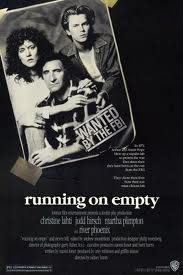
RUNNING ON EMPTY
US, 1988, 116 minutes, Colour.
Christine Lahti, River Phoenix, Judd Hirsch, Martha Plimpton.
Directed by Sidney Lumet.
Running on Empty is an interesting piece of Americana. It was directed by Sidney Lumet, veteran director of many plays (Long Day's Journey Into Night, Equus, Death Trap) as well as a range of entertaining movies (Murder on the Orient Express, Twelve Angry Men, Prince of the City and Serpico). It was written by Naomi Foner, who received an Oscar nomination for her screenplay.
The film focuses on a couple involved in protests of the early '70s - but whose protest resulted in the paralysis and blindness of a nightwatchman. They have been on the run from the FBI, changing identities and keeping out of the public eye. However, they have two children and the oldest is 17 and due to go to college. The film focuses on this older son, his reaction to his parents and way of life, his relationship with the young girl, his piano talent and the possibilities for a future. The film is a very fine coming of age story through the characterisation and performance of River Phoenix (also nominated for Oscar).
Christine Lahti and Judd Hirsch are good as the parents - but the film shows definitely the skill of River Phoenix as an actor.
Not commercially successful on its first release, the film has something of a cult reputation.
1. Entertaining piece of Americana? The '70s and the '80s? Protests, causes, their consequences?
2. The American settings: Florida, New Jersey, New York City? The towns and the cities, on the road? The ordinary American cities? Songs and musical score? The songs of the past? The use of fire and rain?
3. The title, the focus on the road, psychic energy and exhaustion? Values and a future?
4. The introduction to the situation, Danny at baseball, the FBI cars, the warning systems by the boys, the parents involved in causes, their escape? Changing identities, appearances, hair? Vehicles? Names? Contacts with the underground for money?
5. The background of Anne and Arthur: protests, causes, left-wing? The Vietnam War? The bombing protest? The attendant who shouldn't have been there? Danny's birth? On the run? Harry's birth? Anne's parents and their status, her not having seen them for years? The contacts? The news of the death of Arthur's mother?
6. On the move, the research for the new identity, settling into the town, establishing themselves as a family? The quality of their relationships? Danny, his age, sick of moving? Homes, school and difficulties of enrolment, lies and cover-ups? Anne and Arthur getting jobs? Making friends?
7. Danny's story: age, tired of being on the run, coping? Intelligent? At school, the music class and his involvement, classical music and pop, his audition for the teacher and playing both? Decisions about college? Philips' home, the piano, meeting Lorna? Doing Home Economics and working with Lorna? Anger at his father forbidding him to go to the concert, his going, his always being polite? Lorna's room, walking with her, talking, sharing, falling in love? The getting of the shell, the birthday party, the music, the dancing? His hesitation about the sexual relationship? The possibility of going to Julliard? Going to Lorna in the night, telling her the truth, the sexual liaison? The audition for the entrance exam and his skill? Getting the pizza and going to see his grandmother? Playing the piano with his mother, not telling her the truth? Having to be on the move again, his wanting to stay? Going to say goodbye to Lorna? His father getting him to stay on the bike and go to his grandparents? His future?
8. The portrait of Anne and Arthur: the past, the passing of the years, their having to cope, moving, their ideology, yet having to settle as ordinary citizens? The strength of their relationship? The need for money and the support of the group? Arthur and his cooking job? Anne as the receptionist? With their children? Arthur and his sternness towards Danny - and Danny throwing his own principles of freedom back in his face? Not appreciating his son's musical talent? Gus as a rival, the memories, the discussions with Anne? The gun, their ordering him away? Danny supporting his mother at the visit of Gus? The joy of the birthday party and the gifts, the singing and dancing - Fire and Rain? Arthur asking his son about Lorna, sleeping with her, his tolerance of his son? Anne seeing Philips in the restaurant, hearing the news about Julliard? Anne playing with Danny but his not telling her? The discussions with Arthur about Danny's future? Anne going to see her father, the pain of seeing him after so long, her weeping, his reaching out to her? The decision to go, the emergency with the news of the doctors? In the van, their letting Danny go?
9. Harry, the young son, involved in everything, learning the truth about his parents and grandparents? A happy joker? His staying with Anne and Arthur?
10. Lorna and her growing up, relationship with her mother and father, classes, discussions with Danny, showing her room, inviting him to the concert, walking with him, assessing her parents, her delight with Anne and Arthur, the shell, the birthday party? The sexual attraction, her being hurt, cutting him in class, the discussion in the night, learning the truth, sexual liaison? Her father and his going into her room, the discussions about Danny? His leaving, the goodbyes?
11. Philips, his skill in teaching, getting his class interested in music, listening to Danny and giving him opportunities, inviting him to the concert, his relationship with Lorna, tension, the Julliard application and discussions with Danny about his school records, discussions with Lorna, meeting Anne and trying to persuade her about Danny?
12. Gus, from the past, flirting with Anne, the proposal to rob the bank, the arguments, his being ordered away with his guns, the newspapers, the robbery, his taking the credit card locally and forcing Anne and Arthur to move?
13. The dentist and his contact in the city, Anne going to him, his making the phone calls, supplying the money?
14. Anne's father, his severity, unable to speak seeing his daughter after so long, his expression of his deep hurt and uncertainty, the effect on Anne, his decision to take Danny? The glimpse of his wife when Danny visited her?
15. Themes of family and relationships, growing up and apart, the younger generation and their future? The background of the upheaval of the '60s and '70s? Anne and her distance from her father, her talent and lost opportunities? The ironies of wanting to remedy the situation with Danny?
Published in Movie Reviews
Published in
Movie Reviews
Tagged under
Saturday, 18 September 2021 19:25
Run
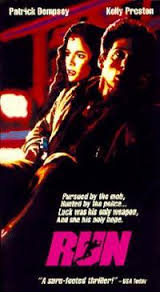
RUN
US, 1991, 91 minutes, Colour.
Patrick Dempsey, Kelly Preston.
Directed by Geoff Burrowes.
Run is a modest but quite entertaining thriller written by Denis Shryack and Michael Blodgett, sometime writers for Clint Eastwood thrillers.
This film was directed by Australian Geoff Burrows, producer of The Man From Snowy River and producer-director of The Man From Snowy River II. The film was not particularly successful in the United States, having more availability on video. However, it is a very competently made thriller. Patrick Dempsey is a brash young man (echoes of Can't Buy Me Love, In the Mood) and is asked to drive a car from Boston to Atlantic City. A gambler, he becomes involved with Connecticut gamblers, leading to the accidental death of the son of the owner of the town. He is pursued by the gangsters, by the police, by some avaricious cops after the reward. In an amazing set of circumstances - many of them made plausible enough, he escapes and saves the day.
The film is very strong on stunt work and action sequences. The moral of the story is that the ordinary individual, with some luck and keeping their wits about them, can outstrip the gangsters.
1. Entertaining action thriller? The plausibility of the plot? The action sequences and stunts? A satisfying resolution?
2. Boston and Connecticut locations, the cities, the highways? The world of gamblers and gangsters? The city at night? The action, editing and pace? Special effects and stunt work? Musical score?
3. The title, the theme of the film, its action?
4. Charlie, the law student, his buddies, winning at cards? The man about town? Work at the garage, the commission to drive to Atlantic City? His self-confidence and brashness? The breakdown of the car, getting it fixed? The taxi-driver taking him to the gambling? His success at poker, antagonising Halloran? The friendship with Karen? His winning, deciding to leave? The clash with Halloran, Halloran's tripping and being killed?
5. Charlie, the police not being sympathetic, the different testimonies of the witnesses? The pursuit by Halloran's father and his henchmen? Charlie using his wits, hiding, trying to ring the police - and then seeing the impatient phone caller being taken away by the police in his stead? His being chased by the corrupt cops? The shootout and his seeing them kill the officer? His being able to hide, run, take cars, drive shrewdly? His going to the shopping mall, seeing Karen? The chase, the crowds? The shooting? People recognising him? The bowling alley, the hotel? His not being able to stop? Getting in Karen's car, getting through the roadblock? Going to her house, getting a chance for a breather? His phoning the FBI? Their trailing him? The thugs getting him, the police getting him - and his being able to escape? The pursuit into the parking lot? The police hanging over the edge and his trying to save them - their fall? Giving himself up, being taken by the chief and Martins to the next county? Their admission of corruption? Their being pushed off the road, the pursuit? The confrontation with Halloran, his being kicked and brutalised? His being taken to the top of the roof, his going over, clutching the trousers - and saving himself? The pursuit through the building? Going to the house across the street? The confrontation with the thugs, his getting the gun? The final confrontation with Halloran and Halloran being impaled? The relief of surviving?
6. Charlie's character, the brash man, being pursued, the effect on him, fear, ingenuity? Getting help from Karen? Not wanting her to be hurt? Her being shot, his going to the hospital? His continued escapes, fatalistic approach to his being killed - but surviving?
7. Karen, her work at the casino, Charlie's advances and her putting him off? Her work at the table? Witnessing what happened? Seeing Charlie at the mall, helping him with the car, the roadblock? At home, her antagonism, trying to run away? Helping him, the escape in the car, her being shot? The pursuit through the fairground?
8. Halloran, the boss of the town, the reaction to his dead son? The boorishness of his dead some and his manner, being spoilt? Sending out the henchmen? The interview with the chief of police and threatening him? His anger at Charlie's getting away, the final confrontation, his kicking him? His own death?
9. The chief, dominated by Halloran, the false report? Things getting out of hand, the greedy cops killing the officer? Martins and his suspicions and evidence? His taking a stand against Halloran? Driving Charlie away - his death in the accident? Martins, integrity, getting the information, pursuing Charlie, taking him? Saving him?
10. The greedy police, the information about the reward, the chases, pursuing Charlie, the shoot-out and their killing the officer? Their cover-up, going into the house first to kill Charlie? Hanging over the edge of the building - and their fall?
11. The locations for the chases, the shoot-outs - the use of urban locations for this kind of action entertainment?
12. The plausibility and implausibility of the plot? The rugged individual taking a stand against corruption and against corrupt legal officers? Ingenuity and wit winning out in the end?
Published in Movie Reviews
Published in
Movie Reviews
Tagged under
Saturday, 18 September 2021 19:25
RPM
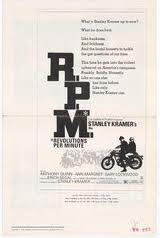
RPM
US, 1970, 97 minutes, Colour.
Anthony Quinn, Ann- Margret, Gary Lockwood, Paul Winfield.
Directed by Stanley Kramer.
RPM stands for revolutions per minute - as applied to the unrest on American University campuses during the protests of the sixties. This is a theme taken up in such films as Richard Rush's Getting Straight and Stewart Hagman's The Strawberry Statement.
In their time, these films were criticised as trying too hard to be contemporary and to reach the audience depicted. However, in retrospect, they are an interesting opportunity to see what things were like in the late sixties (however exaggerated for the purposes of the movie) and the issues of protest that were the atmosphere of the time.
Anthony Quinn gives a sympathetic and even persuasive performance as the self-centred sociology lecturer who is lionised by the students and becomes the University President, having to deal with them, and becoming exasperated in the process, even setting the troops on to the students occupying the University buildings. Ann Margret has her usual sixties' ultra-glamorous sexy role - although she is given a lot of serious dialogue to confront Anthony Quinn. Gary Lockwood and Paul Winfield are the two student leaders. There is a gallery of University board members (including a young Donald Moffatt) and Graham Jervis as the head of the campus police.
The film was directed by Stanley Kramer, best known for so many of his small budget social concern dramas of the fifties - moving into bigger budget and longer films in the late fifties into the sixties such as The Defiant Ones, Judgment at Nuremburg, Inherit the Wind, It's a Mad, Mad, Mad, Mad, World, Guess Who's Coming to Dinner and The Secret of Santa Vittoria (also with Quinn).
1. Interesting picture of campus unrest in the late sixties? Criticized as exploitive in its time? In the retrospect of the decades and the perspective on protest on campuses in the sixties?
2. The University campus, school buildings, board rooms? The life around the campus? Action sequences, the final confrontation? Musical score and songs?
3. The title - and its reference to campuses and protest?
4. The Universities in the sixties, the dissatisfied students, the curriculum, the need for change, tenure and the role of staff? The Universities and change, the role of Boards, their not understanding youth? The need for some kind of revolution? The background of civil rights and freedoms in the sixties? Permissiveness? The context of the Vietnam War? The actual shootings and riots on such campuses as Berkeley and Kent State?
5. The students, Rossiter and his leadership, Steven and the blacks? The group with the leaders, occupying the classrooms? Their loyalties? Their disdain of the staff, older people? Freedom, the twelve points? Concern about studies, staffing, rights of blacks? The confrontations with the staff? With Paco? The negotiations? The self-confidence, even smugness? The possibility of black clashing with white, their need for self-assertion? The preparation for the assault? The tear gas, the police, the battering? Prison? The deals - and the future? The leaders and their getting roles in the University? The characters of Rossiter and Steven, with Paco, negotiating with each other, clashes between black and white?
6. The Board, its composition, conservatives, bankers, academic staff, chaplain? The chaplain more sympathetic to the young? The meetings, the late discussions? The resignation of the President? The nomination of Paco? The meetings with him, not listening to him, the clashes? The support of action? Their world collapsing around them?
7. Paco, Anthony Quinn and his style? Relationship with the students, with Rodha? His sociological work and publications? Woken up, the meeting, relationship with the Board? Sympathies with the students? Social reform, sociological patterns? Discussions with the students, sympathy, their attacking him? His emphasis on his age? Experience? The stories about his growing up and the changes in the sixties? The attempts at negotiation, the various points, curriculum, appointments, tenure? The black Registrar? The sticking-point about the students controlling curriculum? His going back, his being ridiculed? The relationship with Rodha, listening to her? His decision to send in the police, the talk with the coach, the talk with the Police Chief? Not wanting violence? The ultimatum, the clashes, the violence? His reaction - and seeing Rodha there? The final conversations - after paying the bail money? With the Board, with the students? His future?
8. Rodha, the glamorous student, the relationship with the professor? The permissiveness and sex style? Her angers with Paco? Going out with him, the conversations, sympathy with the students? Disparity of age, her joining with the students?
9. The police, the discussions about violence? The coach and his antagonism towards the youngsters? The tear gas, the attack? The fight - and the brutality? The young people besieged, the young people and the attack?
10. Memories of the sixties, social transitions in the United States, the background of the War? Freedoms? Academic life and protest?
Published in Movie Reviews
Published in
Movie Reviews
Tagged under
Saturday, 18 September 2021 19:25
Route 9
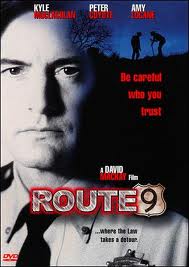
ROUTE 9
US, 1998, 95 minutes, Colour.
Kyle Mac Lachlan, Peter Coyote, Wade Andrew Williams, Amy Locane, Roma Maffia.
Directed by David Mackay.
Route 9 is a variation on the simple plan story: two men find easy money, steal it, make stupid decisions, fail to realise that investigators would have clues and evidence, fall out amongst themselves and cause death and destruction.
The film opens with a shootout, a drug deal in which an undercover agent is injured. The two police first on the scene think he is a criminal and kill him. However, he was wearing a tape which is found by the forensic examiner of the body, who uses it for blackmail of the police. One of the policemen is involved in an affair with the sheriff's wife. The various complications ensue.
While this is a generally routine story, the strong cast, especially Kyle Mac Lachlan as the policeman having the affair but who has some sense of conscience, and Peter Coyote as the brutal sheriff. Wade Andrew Williams is introduced in this film and is an effective, callous villain. Roma Maffia leads the DEA investigation.
Filmed on location in Nevada, it is quite an exciting if ordinary thriller.
1. The popularity of this kind of story: easy money, complications, detection, destruction?
2. Route 9 in Nevada, the isolation of the town, the people, the Nevada desert, Reno? The contrast with the sophistication of California? The chases on Route 9? Musical score?
3. The initial confrontation, the drug runners, the money dealers, the stances and postures, the shootouts? Earl and Booth arriving on the scene, their discovery, the money, their decisions, their behaviour, killing the agent, the destruction of the car?
4. The situation in the town: Dwayne as sheriff, slow, methodical? His love for Sally but his brutality towards her? Showing her off in the station? Booth and his relationship with her? His hopes for a better life? Earl, his debts, borrowing money, his relationship with his mother (giving her the television)? The other members of the staff? Jesse and his being the doctor in the town? Working with the police?
5. The arrival of Ellen Marks and the beginnings of the investigation, the reaction of Dwayne, of Earl and Booth? The issue of the tape and their playing it? The irony of Jesse taking it, blackmailing Earl and Booth, the copies, the demands of the money, his blackmailing them, the visit to Reno and gambling, further demands, their tying him up, injecting him with the potassium (his suggestion) and his death?
6. Booth and the promise to Sally, buying her the lingerie (and using the marked money)? His giving her the gift, the plans? The digging up of the money, finding that Earl had taken some? The mixture of conscience and loyalty? The reaction to Jesse, his not wanting him dead? His collaboration in the investigation? The final confrontation with Dwayne, the shootout, his grief at Sally's death, confronting Earl, his being killed? The irony of his hiding the money and leaving the note?
7. Earl, his personality, greed, the clash in the bar, the truck, spending big, the television? The menthol cigarettes to Ellen Marks and finding the butt in Jesse's house? His ruthlessness, pressurising Booth? His being found out, confronting Booth, pretending not to shoot him, killing him? The irony of the note, Ellen Marks killing him?
8. Dwayne, his relationship with Sally, paranoid, brutal, the confrontation and his death?
9. The DEA investigators, Ellen Marks and her thoroughness, Wallis and his detection, the clues, putting the pieces together, Earl pushing Wallis over the cliff? The final solution to the case?
Published in Movie Reviews
Published in
Movie Reviews
Tagged under
Saturday, 18 September 2021 19:25
Rouge Baiser
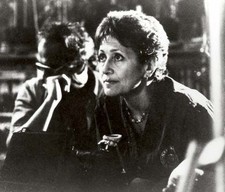
ROUGE BAISER
France, 1985, 112 minutes, Colour.
Charlotte Valandrey, Lambert Wilson, Marthe Keller, Laurent Terzieff.
Directed by Vera Belmont.
Rouge Baiser is a French, West German co-production directed by Vera Belmont, an autobiographical story. She contributed to the screenplay.
The film has a prologue, in black and white, in Paris 1937. It focuses on Polish- Jewish refugees in Paris. The scene then shifts to 1952 and focuses on Branca's 15-year-old daughter, Nadia. The group is communist in the time of Stalin, with an admiration for Stalin. However, as the action continues and Nadia becomes involved with a photographer, it emerges that there is a strong anti-Stalinist approach in the film. Branca's lover, Moische, re-emerges after 15 years in the camps of Siberia, a victim of Soviet anti-Semitism. The plot is also complex with the photographer being arrested and accused of statutory rape and opting to take service in Indo- China, '53 to '55, instead of prison. This, of course, brings up the involvement of the French in Indo- China and the defeat and Dien Bien Phu.
The film is complex in its presentation of characters - but is an interesting retrospect on staunch communists of the Stalinist period.
1. Interesting and entertaining film? Portrait of people and relationships? Portrait of ideologies and people committed to ideologies? The semi-autobiographical plot and the contribution of the director?
2. The black and white prologue, the colour photography of Paris in the '50s - suggestions of atmosphere? The musical score - and the title song, heard on the radio?
3. The title - the kiss of communism? The make-up? The song on the radio?
4. The prologue, 1937? The neighbourhood in Paris? Branca, her work as a dressmaker? Her pregnancy? Her relationship with Moishe? The communist, afraid of the police? His return to Moscow, promise to send for her? The black and white photography in contrast with the colour?
5. The shift to Paris, 1952? The neighbourhood, Branca and her work as a dressmaker? Her marriage to Herschel? Nadia, Branca's love for her daughter? Communism? Branca and her concern about Nadia's behaviour? With the young people? The police? Nadia's relationship with Stephane? His photographs? The sudden return of Moische? Herschel's anxiety? The response to Moische's anti-Stalinist speech? Branca and her love for Herschel? Her memories of Moische? Nadia's troubles, the possibility of prosecution of Stephane? Her being expelled from the party? Nadia and her talking with her mother about the past, about Moische? Uncle Vanya and the encounter with Moische? Branca's memory of performing in the cherry orchard?
6. Nadia, her background, accepting communism? Accepting Stalinism - and writing to Stalin? Her being a 15-year-old girl, wanting to have fun? The clubs, the youth and their roughness in the neighbourhood? The anti-American demonstration? The police, their attack? Her being rescued by Stephane? His taking photos of her face and wounds? The friendship? Disdaining his lack of commitment, calling him bourgeois, involvement with the fascist paper? His hearing her exaggerating the police brutality? The meeting and the protest against the arrest of the communist leader? Her going with Stephane to the jazz club St. Germaine? Her criticism of his friends, their decadence? Her being upset with the photographs, the identification and persecution of some of the members? Her losing her job? Her work as a seamstress, but her hating it? Her saving him when he is attacked by the comrades? The affair and its effect on her? Moische's return? Listening to his anti-Soviet speech? Her disillusionment? Going with Stephane, the assignment, the affair, love? Herschel's intervention after her disappearance? Learning to use the camera, her return home? The expulsion from the party? Her finding out that Stephane has gone to Indo-China? Her talk with her mother and listening to the story of her mother's affair? Her future?
7. Moische, on the run, the communist of the '30s? Polish-Jewish? Going to Paris? His disappearance? His return, relationship with Branca, with Herschel? His bitter anti-Stalinist speech? Soviet anti-Semitism? Siberia? His influence on Nadia? His living on in Branca's memory?
8. Herschel, his love for Branca, caring for Nadia? Act of communist? His strictness as a father? The return of Moische? His uneasiness? Nadia and the affair? Her disappearance? The discussions with the police? Pressing charges of rape? His future?
9. Stephane, the young photographer, attracted by Nadia, photographing the demonstration, photographing her face? Their discussions, attraction? His hearing her exaggerate and exposing her? The jazz club? Her criticisms of his friends? The reaction to the photos in Paris Match? The vengeance of the communists on Stephane for the harassment? The affair? The love affair? The three-week photo assignment? Their lives together? The prosecution - and Stephane's option to go to Indo-China? Serving with the paratroopers - his future?
10. The retrospect on the enthusiasm of communists in the '30s, their hopes in Moscow and Stalin? The experience of the '40s - and the significance of Moische's speech? The disillusionment in the '50s, the truth about Stalinism? The changes in communism?
11. A portrait of France in the period, anti-communist? Internal problems? Right and Left? The involvement in Indo-China? - and the consequences for the war of the '60s?
12. The blend of political themes with human themes?
Published in Movie Reviews
Published in
Movie Reviews
Tagged under
Saturday, 18 September 2021 19:25
Romance of Rosy Ridge, The
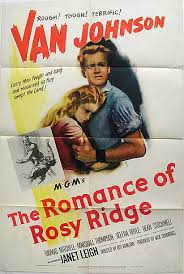
THE ROMANCE OF ROSY RIDGE
US, 1947, 103 minutes, Black and white.
Van Johnson, Thomas Mitchell, Janet Leigh, Selena Royle, Marshall Thompson, Dean Stockwell.
Directed by Roy Rowland.
The Romance of Rosy Ridge introduced a 20-year-old Janet Leigh. She stars with Van Johnson, a genial teacher who returns from the Civil War to a family in Missouri. Thomas Mitchell and Selena Royle are sturdy as the parents. Dean Stockwell is the young brother.
The film creates the atmosphere of the Civil War, its aftermath of hostility and the United States trying to get on its feet again. Romantic, humorous, piece of Americana with sentiment.
Direction is by veteran Roy Rowland; dances choreographed by Jack Donohue. Van Johnson sings songs composed for the film as well as many traditional American songs.
1. Human drama? Aftermath of the Civil War? Rural America in the 19th century?
2. MGM production values, black and white photography, the cast? Traditional songs?
3. The title and its tone?
4. The picture of the aftermath of war, continuing hostilities, the burners, prejudice? The hopes for reconciliation?
5. The portrait of the family, the strong relationships? The news about Ben? The family at work, on the land? Their hopes? The burning of the barn, the rebuilding of the barn? Henry's arrival, the welcome, his staying? The various reactions?
6. The work, the harvest, the threatening storm, getting in the hay? The delighted laughter? The arguments? Love?
7. Baggett and his wife, the arguments? Hopes, the grain for the barns? The idea of the party? The questions about both sides coming? The party not starting, mother dancing? The joy? The picking of the fight? Henry having to take sides? Their going home?
8. Henry, his playing the mouth organ, arrival? At home with the family? Singing? Work, saving the harvest? The idea of the party and reconciliation? Starting the school? In love with Lissy Ann? His having to make a choice? His being vindicated in discovering the burners? The chase and the shoot-out? The flashbacks, his meeting Ben, friendship, fighting together, bringing home the letter?
9. Lissy Ann, young and attractive, her hopes, falling in love with Henry, work, the dance, being hurt by his decision? Her own decision to leave, the support of her mother?
10. The sketch of the parents, their strength? The mother and her support? The father and his southern prejudice? Hopes for Ben's return? Young Andrew and his being part of the family, his verve, fishing with his father, the square dancing? Ben and the picture of him in the flashbacks? His death?
11. The father and his sons and their hostility, the burners? Picking the fight at the dance?
12. The portrait of the people of Missouri, the experience of the war, neighbour not talking to neighbour, divided families? The land? The need for life to start again? A piece of Americana?
Published in Movie Reviews
Published in
Movie Reviews
Tagged under
Saturday, 18 September 2021 19:25
Roswell
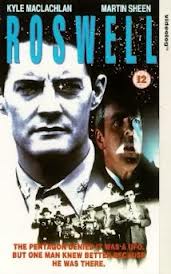
ROSWELL
US, 1994, 95 minutes, Colour.
Kyle Mac Lachlan, Martin Sheen, Dwight Yoakim, Kim Greist, Peter Mac Nicol, Bob Gunton, Xander Berkeley, Philip Baker Hall, Eugene Roche.
Directed by Jeremy Kagan.
Roswell is the dramatising, by playwright Arthur Cobbett who also appears as a doctor, of the 1991 book UFO Crash at Roswell. There have been numerous documentaries made about this New Mexico base where allegedly the US government covered up the UFO landing. These stories have been the basis for many movies from Close Encounters to Independence Day (and parodied by Mars Attacks).
The film focuses on the actual officer Jesse Marcel and his role in the discovery of the UFO and his being the fall guy for the cover-up. In the context of a reunion 30 years later, Marcel remembers the past but also interrogates a range of people to try to find out the truth. He finally encounters Townsend, played by Martin Sheen, who reveals to him a lot of the discussions of the period - but gives a final speech warning of the dangers of imagination, self-fulfilling prophecies, lack of evidence and the need for open-mindedness.
The film is well dramatised. It will certainly support those who believe in UFOs and the cover-up. For those who don't believe, it is an interesting drama on a controversial issue.
1. The interest in Roswell? Fifty years? Documentaries? Feature films and mini-series?
2. Roswell and its fame, the credibility of the claims? The credibility of the cover-up?
3. Audience belief in the stories of Roswell? The evidence offered? Researched books? Townsend's warning at the end asking for open-mindedness?
4. The stance of the screenwriter? Pro the events, critical of the events and the claims? The atmosphere of authenticity?
5. The opening credits, the introduction and information, the range of interviews? The range of perspectives? Issues of life and intelligence in the universe? "We are not alone"? Contact from other planets and galaxies?
6. The structure of the film: the 30-year reunion, the focus on Jesse Marcel, his memories? The reunion, the photos, the ageing men and women, the television news giving the information about Marcel, the government action? The interviews and the humiliation of Marcel? His being there with his wife and son? His determination to understand the past and to vindicate his stances and beliefs?
7. The background of the events of Roswell, the military base, life at the base, weather issues, the experience of the light, the crash, the aftermath?
8. The variety of reactions to the events? The sheriff and his swagger, giving information, wanting to be on the media? His staff? The farmer and his giving his information? The reaction of the sheep, the farmer wanting the reward? The initial reaction of the military officers?
9. Jesse Marcel's job, examining the material? His discussions with the family, telling his son, giving him a piece of the foil?
10. The speculations, the concern about the Russians, the press reports? Carson and Lewis and their discussions? The chief officer? The sealing off of the area, the crowds, the forbidding of people to go in, including the sheriff?
11. The foil and its behaviour? The gradual wariness? The press conference and Marcel being the fall guy, the theory about the weather station? The asking for explanations from Carson? Lewis? Asking his son for the foil back?
12. The reunion, the social gathering, people talking? The mockery of Marcel? The encounter with Frank and the memories of his broadcasts? His giving the news? His reminisces, his not believing the information given, his research?
13. Lewis, the golf game, the memories, Lewis telling the truth but under promise of silence, the memories with Carson, the reconnaissance?
14. The two guards, the reminiscences, their information? The flashbacks and the guard looking at the creatures but keeping silent? The mortician, his going to the hospital, his being ousted, his relationship with Janet, the information that she gave him?
15. Townsend and his approaching Marcel? Sympathy, his own researches? The visualising of the round table discussion at the highest level, the range of issues, social, religious? The decision for the cover-up? The visualising of the creatures, the interrogation? Trying to communicated, the death of the creature?
16. The role of memories - and reliability? The need for evidence?
17. Townsend's speech, the nature of theories, the nature of evidence, the nature of the imagination, wishful thinking and self-fulfilling prophecies? The need for open-mindedness on both sides? Yet Marcel's satisfaction, going back to the field, with his son and wife and feeling vindicated?
Published in Movie Reviews
Published in
Movie Reviews
Tagged under